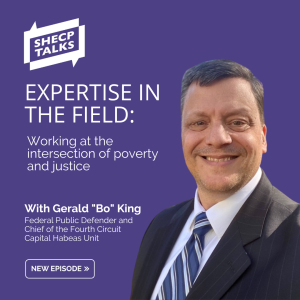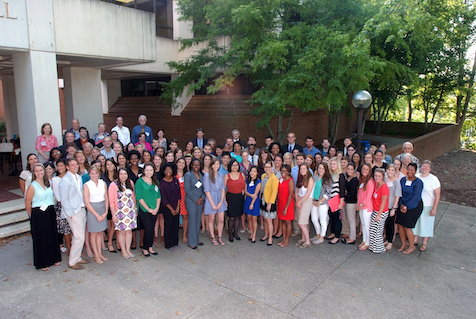Episodes

Tuesday Aug 30, 2022
Tuesday Aug 30, 2022
This summer SHECP hosted several events with innovative and dynamic leaders doing anti-poverty work. On this episode of SHECP Talks we will listen in on a talk SHECP’s director had with Gerald “Bo” King, Federal Public Defender and Chief of the Fourth Circuit Capital Habeas Unit.
King begins by explaining what capital habeas law is. Next, he explains how he sees poverty and the criminal justice system intersect during capital trials. “The death penalty is a product of poverty,” King says. “Death sentences depend enormously on the lack of funding for defendants facing death sentence or even the imposition of death sentences. States that put resources into capital defense, have very few death sentences. They are really intertwined.”
King also discusses trends in capital trials that he has seen throughout his career, specifically, whether capital trials and executions are becoming more frequent. King’s work has somewhat transformed over the years from being primarily rhetorical to telling the story of his clients. By painting a complete picture of his client’s lives he helps the jury understand what led the client to a crime that, at first, might seem inexplicable.
Finally, King takes questions from students and concludes his talk by discussing how he maintains his hope, as a capital defender, despite the odds often seeming difficult to overcome. “There are inspirations and sources of hope everywhere, not hoping is just not an option,” King says.
For further information:
David Shipler book: The Working Poor
Gilbert King book: Devil in the Grove
Center for Death Penalty Litigation

Monday Jun 27, 2022
Monday Jun 27, 2022
On this episode of SHECP talks we are joined by Dr. Rachel Terman, Associate Professor of Sociology at Ohio University. Dr. Terman joins us to discuss her class, Sociology of Appalachia, which covers everything from the correct pronunciation of Appalachia (app-ah-lah-cha or app-ah-lay-cha) to the economic history, and cultural ideas revolving around the region.
Terman works with Little Cities of Black Diamond, a nonprofit that represents a collection of former coal mining communities. Little Cities of Black Diamond seeks to preserve the history and culture of Appalachia through different events and programming. Terman’s students get involved with this organization and learn about the difference an organization can make in the communities it serves.
Terman discusses the three questions she hopes her students can answer at the end of the course. “What is Appalachia? Who are Appalachians? and so what?” says Terman, “They sound a little simplistic at first but I orient content to answer each of those questions.”
Finally, Terman describes some of her research, which revolves around the identities of Appalachian people. Terman’s research, particularly focused on Intergenerational Identities in recent years, points to a trend of younger generations continuing the work that older generations started.

Sunday Apr 10, 2022
Sunday Apr 10, 2022
On this episode of SHECP Talks, we speak with Dr. Ellen Prusinski, Associate Professor of Education at Centre College, about her experience both in the classroom and outside of it, as a researcher.
Dr. Prusinski discusses the class she teaches now, “Education Policy and Social Change”, which examines the question: does education policy drive social change? Prusinski says “I think the class raises some really foundational questions about how we expect schools and education to be spaces that create more equity in our society and whether or not we have the policies to support that big social goal.”
She also talks about her role as coordinator of Engaged and Experiential Learning, and how that role affects the classes she teaches. Finally, she discusses her current research and how it was sparked by a student project that wanted to look at “childcare deserts”, regions that have far more young children than they have space in childcare.

The Shepherd Higher Education Consortium on Poverty (SHECP), a 501(c)(3) nonprofit organization, encourages the study of poverty as a complex social problem, by expanding and improving educational opportunities for college students in a wide range of disciplines and career trajectories.
Through its programs, SHECP and its member institutions prepare students for a lifetime of professional and civic efforts to diminish poverty and enhance human capability, while also supporting connections among students, faculty, staff, and alumni engaged in the study of poverty.
Learn more at shepherdconsortium.org.



